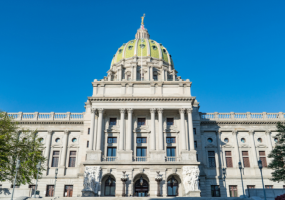 As the FY 2024-25 Fiscal Year ended last week and budget negotiations on the current Fiscal Year continued in Harrisburg, the legislature returned to session and acted on several bills that could impact business operations.
As the FY 2024-25 Fiscal Year ended last week and budget negotiations on the current Fiscal Year continued in Harrisburg, the legislature returned to session and acted on several bills that could impact business operations.
Lawmakers advanced proposals to regulate financial service fees, impose new rules on subscription services, and expand workplace mandates for public employers. Additionally, a bipartisan committee vote moved forward a targeted incentive to help biotech and tech startups raise capital through unused Net Operating Losses (NOLs).
Here is a recap of last week’s legislative action most relevant to employers:
State Budget Update
Pennsylvania’s new fiscal year began last Tuesday, July 1, without a finalized state budget, as negotiations between the Shapiro administration and legislative leaders remain ongoing.
While lawmakers and the governor have indicated progress is being made, significant disagreements reportedly persist over long-term fiscal planning, use of reserve funds, and various policy priorities ranging from transit funding to the regulation and taxation of skill games.
As the Pittsburgh Post-Gazette reported, the passage of the June 30 deadline “will have no real practical effect for at least several weeks,” and budget talks are expected to continue at least through mid-July.
Government Overreach, Price Fixing for Financial Institutions (H.B. 1553; Sanchez)
The House of Representatives voted along party lines (102-101) to advance House Bill 1553 last Monday.
This legislation mandates a statutory cap on overdraft and nonsufficient fund (NSF) fees imposed by banks and credit unions.
This legislation would create new, unprecedented price-fixing regulations, expanding government overreach into the business operations of financial institutions. Overdraft programs are optional for customers and heavily regulated under existing federal law, requiring consumer opt-in and transparent disclosure of terms.
The current system allows consumers to make informed choices, and competition within the industry incentivizes fair pricing and clear communication. House Bill 1553 undermines this healthy market dynamic by inserting state government control into areas best left to consumers and their financial institutions.
We opposed this bill (CLICK HERE for our memo), which now advances to the Senate.
Regulating Recurring Subscriptions (H.B. 129; Borowski)
The House of Representatives also voted 159-43 to advance House Bill 129 last Tuesday.
This legislation would amend the Unfair Trade Practices and Consumer Protection Act to require businesses to obtain explicit consumer consent before enrolling customers in automatic renewals, along with detailed mandates on how promotional offers must be presented. The bill also includes a private right of action, increasing litigation concerns for businesses.
We opposed this bill (CLICK HERE for our memo), which now advances to the Senate.
Workplace Regulations and Paid Leave (H.B. 1629; Rabb)
The House Judiciary Committee voted along party lines (14-12) to advance House Bill 1629 last Monday.
This legislation proposes a comprehensive set of regulations on “public” employers related to paid leave, safety standards, training, reporting, and risk assessment, among other areas.
However well-intentioned, legislation of this significance should at least be carefully developed in consultation with the employers who will be required to implement and operate under it, which may include quasi-private entities such as higher education institutions and public transit companies. This bill has also prompted concerns that it may duplicate existing standards, creating compliance traps.
We urged lawmakers to hold off on considering this proposal; it now advances to the full House.
Sellable NOLs (H.B.1129; Friel)
The House Finance Committee voted 24-2 to advance House Bill 1129 last Tuesday.
This legislation would create a program that would allow biotech and tech start-up companies to sell unused Net Operating Losses (NOLs) under certain conditions.
The program would promote financial flexibility by allowing companies to leverage NOLs to generate operating capital. More favorable NOL treatment may stimulate investments and promote economic activity in Pennsylvania. Traditional use of NOLs helps companies that have lost money in previous tax years once they are making a profit. This legislation would target support to companies earlier in a business lifecycle when they are losing money and hopefully help more startups turn the corner to profitability.
We supported this bill (CLICK HERE for our memo), which now advances to the full House.
Veterans Posting Requirement (H.B. 799, Deasy)
The House and Senate have sent to Governor Shapiro legislation directing employers to post information for their employees outlining veterans benefits and services. The PA Chamber worked with lawmakers on multiple improvements to the bill:
- Small business exemption: The requirement now only applies to employers with a worksite in PA at which more than 50 full-time employees are employed.
- Standard form: The bill directs the Department of Military and Veterans Affairs to create a standard form and directs the Department of Labor and Industry to post it on their website so employers will not have to create their own.
- Online posting: Employers may satisfy the requirement by posting the information on an employee accessible website.
- Effective date: Lawmakers agreed to double the effective date from 90 to 180 days.
Stay tuned to the PA Chamber in the coming months for more information about this new requirement.